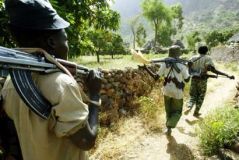Darfur rebels, Sudan in talks, urged to end war
N’DJAMENA, Feb 17 (Reuters) – Rebels from Darfur and Sudanese officials met for talks on Thursday in Chad, under international pressure to end a conflict causing what U.N. Secretary-General Kofi Annan has called a near “hell on earth.”

|
|
SLA rebels patrol in south Darfur (Reuters) . |
The meeting in Chad’s capital N’Djamena came a day after Annan called on the U.N. Security Council to take immediate action to stop the violence in Darfur, which has killed at least 70,000 people and displaced 2 million.
“Darfur’s people are living in hell,” said Chadian President Idriss Deby at the start of the talks, which were also attended by international mediators and African Union (AU) Commission Chairman Alpha Oumar Konare.
“We hope the parties will declare a total and definitive ceasefire. It is time for them to respect their commitments,” Deby told the talks’ opening session late on Wednesday.
The meeting aims to reinforce Darfur’s oft-violated truce and pave the way for full political negotiations between the warring parties.
Representatives of Darfur’s two main rebel groups — the Sudan Liberation Movement (SLM) and the Justice and Equality Movement (JEM) — attended the talks.
After years of tribal conflict over scarce resources, the rebels took up arms in February 2003, accusing Khartoum of neglect and giving preferential treatment to Arab tribes.
They say the government mobilized Arab militias, known as Janjaweed, to loot and burn non-Arab villages. The government says it recruited militias to fight the rebellion but not the Janjaweed, whom it has called outlaws.
Konare said as soon as the N’Djamena talks were over a team of AU and Chadian officials would be sent to Darfur to map out the positions of the belligerents and verify that promises made were being respected.
“The time of interminable talking is over. We must act fast and well with those who want to remain on course for peace,” Konare said.
The talks were due to end later Thursday.
On Wednesday, African heads of state, including the president of Sudan, warned the international community not to send non-African troops or to impose sanctions.
But at the United Nations, Annan backed a call by President Bush’s administration for a travel and assets freeze on those violating the ceasefire.
He said the U.N. Security Council should consider a full range of options — targeted sanctions, stronger peacekeeping efforts, new measures to protect civilians and pressure on all sides for a lasting political solution in the western region.
